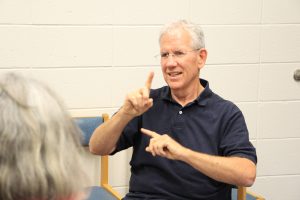ASL Interpreter Program Fulfills Need
There is a “dire” need for American Sign Language interpreters and Northern Essex Community College is helping to fill that need with its new Sign Language Interpreter Certificate Program – the only one of its kind in Massachusetts.
“State-wide and nationally there is a desperate need for sign language interpreters,” said Kevin Fleese, American Sign Language Studies Program coordinator. “The program feeds the immediate needs of the Deaf and Hard of Hearing community”.
At least a dozen students, all of whom already hold either an associate or bachelor’s degree, are enrolled in NECC’s certificate program, which falls under the Deaf Studies Department.
The interpreter certificate is designed to prepare individuals for entry-level interpreting work in American Sign Language (ASL). Prerequisites include completion of ASL 1 and 2.
This intensive program is offered during the day, two days a week with a third day necessary for practicums. The 15-course program spans the fall and spring semesters over two years.
Katelyn Richardson is enrolled in the program. The Wilmington resident graduated from James Madison University in 2017 with a Bachelor of Science degree in Health Science with a minor in biology. With designs on becoming a sign language interpreting physician’s assistant (PA), Richardson is busy accruing the physician assistant program requirement of 2,000 patient-care hours by working for a physical therapist in Andover.
Fleese said that while in general more ASL interpreters are needed, college-educated interpreters from diverse backgrounds like Richardson are ideal.
Richardson first became interested in ASL while attending Wilmington High School. She did so well in the ASL course that she tested out of the college-level ASL at James Madison. Richardson was happy to learn Northern Essex had an intensive certificate program.
“I was looking for a program that fit my schedule and was affordable,” she said. “I found what I was looking for at Northern Essex.”
Fleese said the medical setting is just one of many where interpreters are needed. The U.S Department of Labor lists interpreters as one of the number one in demand professions, he noted.
“Today, the ratio of interpreters to the number of deaf and hard of hearing is grossly disproportionate,” he said.
“The certificate is designed to provide students with a foundation in American Sign Language as well as Deaf Culture,” said Fleese. “Through their practicums they will have the opportunity to explore careers in the Deaf/Hard of Hearing community eventually working as entry-level professional interpreters.”
The certificate prepares students to take the state-level Massachusetts Interpreter Screening and work in educational settings, conferences and public events, and health care settings.
For additional information on this certificate program, contact Fleese at kfleese@necc.mass.edu or call 978-241-7049.
Northern Essex also offers an associate degree in Deaf studies that also prepare individuals for a career in a Deaf/Hard of Hearing/Deaf/Blind communities.
Gallaudet University, the only university designed to be barrier-free for deaf and hard of hearing students, has its Regional Center East located on the Northern Essex Haverhill campus. For additional information on Gallaudet email gurc.necc@gallaudet.edu or call 978-556-3701 or call the video phone at 978-241-7417.








